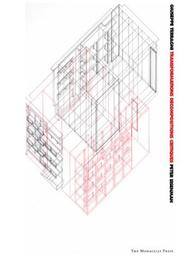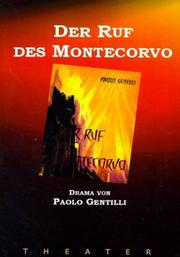| Listing 1 - 5 of 5 |
Sort by
|

ISBN: 1885254962 9781885254962 Year: 2003 Publisher: New York, N.Y. Monacelli
Abstract | Keywords | Export | Availability | Bookmark
 Loading...
Loading...Choose an application
- Reference Manager
- EndNote
- RefWorks (Direct export to RefWorks)
Forty years in the making, Giuseppe Terragni: Transformations, Decompositions, Critiques documents and investigates two of Italian rationalist architect Giuseppe Terragni's masterworks: the Casa del Fascio (1933-36) and the Casa Giuliani-Frigerio (1939-40), both in Como. This far-reaching study - illustrated with more than five hundred original architectural diagrams and archival photographs - employs what Eisenman calls critical and textual reading of both buildings. He attempts to broaden the definition of the formal from a narrow aesthetic and compositional view to include first the conceptual and then the textual. It is through this idea of the textual that Eisenman begins to define an idea of the critical in architecture. Eisenman's methodology is wholly removed from traditional approaches - social, historical, aesthetic, functional. Instead, the various articulations and openings on the facades constitute a set of marks, notations that provide the basis for his analysis. In the Casa del Fascio, for example, each of the four sequential design schemes records the previous state, encoding the process of transformation in the final building. In the Casa Giuliani-Frigerio it is instead the process of decomposition that generates the facades. Also included in the book are an essay by Terragni and a critique by Manfredo Tafuri. In the end, it is the dual protagonists - the architect and the author - who together establish a new theoretical and analytical framework. (from editor)
Terragni, Giuseppe, --- Eisenman, Peter, --- Casa del Fascio --- Casa Giuliani-Frigerio --- Casa del Popolo --- 72 --- Terragni, Giuseppe --- Eisenman, Peter --- Como --- Lombardia --- Terragni, Giuseppe 1904-1943 (°Meda, Italië) --- Eisenman, Peter °1932 (°Newark, New Jersey, VS) --- Como ; Casa Giuliani-Frigerio ; Casa del Fascio --- Architectuur ; Italië ; rationalisme --- Architectuur ; modernisme ; 1890-1940 ; Italië --- Architectuur ; fascisme ; nationalisme ; Italië --- 72.07 --- Architectuur --- Architecten. Stedenbouwkundigen A - Z --- Analyse architecturale --- Architecte --- Architecture contemporaine --- Italie --- Architecture --- History --- Casa del fascio (Abbadia, Italy) --- Casa Giuliani-Frigerio (Como, Italy) --- Terragni, Giuseppe, 1904-1943 --- Terragni, Guiseppe
Book
ISBN: 9780691203911 Year: 2020 Publisher: Princeton, NJ
Abstract | Keywords | Export | Availability | Bookmark
 Loading...
Loading...Choose an application
- Reference Manager
- EndNote
- RefWorks (Direct export to RefWorks)


ISBN: 3791311360 9783791311364 3791311166 9783791311166 Year: 1997 Publisher: Munich Prestel
Abstract | Keywords | Export | Availability | Bookmark
 Loading...
Loading...Choose an application
- Reference Manager
- EndNote
- RefWorks (Direct export to RefWorks)
Leading architects present their views on deconstruction and new modernism.
Deconstructivism (Architecture). --- Architecture --- Architecture, Postmodern. --- Forecasting. --- Deconstructivism (Architecture) --- Architecture, Postmodern --- 72.036 --- Postmodern architecture --- Architecture, Deconstructivist --- Deconstructionism (Architecture) --- Deconstructivist architecture --- Forecasting --- 20ste eeuw (architectuur) --- Twintigste eeuw (architectuur) --- Postmoderne architectuur --- Postmodernisme (architectuur) --- Architecture, Modern --- Constructivism (Architecture) --- Deconstructivism --- Deconstructivism. --- Deconstructivist --- New Modernist --- Postmodernism
Book

ISBN: 0674973267 0674973240 9780674973244 9780674970519 0674970519 Year: 2017 Publisher: Cambridge, MA
Abstract | Keywords | Export | Availability | Bookmark
 Loading...
Loading...Choose an application
- Reference Manager
- EndNote
- RefWorks (Direct export to RefWorks)
Depictions of the Holocaust in history, literature, and film became a focus of intense academic debate in the 1980s and 1990s. Today, with the passing of the eyewitness generation and the rise of comparative genocide studies, the Holocaust's privileged place not only in scholarly discourse but across Western society has been called into question. Probing the Ethics of Holocaust Culture is a searching reappraisal of the debates and controversies that have shaped Holocaust studies over a quarter century. This landmark volume brings international scholars of the founding generation of Holocaust studies into conversation with a new generation of historians, artists, and writers who have challenged the limits of representation through their scholarly and cultural practices. Focusing on the public memorial cultures, testimonial narratives, and artifacts of cultural memory and history generated by Holocaust remembrance, the volume examines how Holocaust culture has become institutionalized, globalized, and variously contested. Organized around three interlocking themes-the stakes of narrative, the remediation of the archive, and the politics of exceptionality-the essays in this volume explore the complex ethics surrounding the discourses, artifacts, and institutions of Holocaust remembrance. From contrasting viewpoints and, in particular, from the multiple perspectives of genocide studies, the authors question if and why the Holocaust should remain the ultimate test case for ethics and a unique reference point for how we understand genocide and crimes against humanity.
Holocaust, Jewish (1939-1945) --- Holocaust memorials. --- Culture --- Cultural sociology --- Sociology of culture --- Civilization --- Popular culture --- Memorials --- Moral and ethical aspects. --- Historiography. --- Public opinion. --- Study and teaching --- Social aspects
Book

ISBN: 3035612188 9783035612189 9783035612196 3035612196 9783990434406 3990434403 Year: 2016 Publisher: Basel
Abstract | Keywords | Export | Availability | Bookmark
 Loading...
Loading...Choose an application
- Reference Manager
- EndNote
- RefWorks (Direct export to RefWorks)
Wolf D. Prix, Mitbegründer von Coop Himmelb(l)au, war mehr als 20 Jahre der Leiter des Studio Prix an der Universität für angewandte Kunst Wien. Seine architektonischen Visionen prägten das Studio, das von Anfang an für Radikalismus, hochkarätige Strategien und in die Realität übertragene und umgesetzte Utopien stand. Studio Prix war ein Kreativzentrum, das intensive Betreuung bot. Diese Publikation beinhaltet eine Auswahl von Projekten und Diplomarbeiten von Studierenden, sowie Ausführungen von internationalen Freunden wie den ArchitektenHitoshi Abe, Hernan Diaz Alonso, Klaus Bollinger, Chris Bangle, Aaron Betsky, Mario Coyula-Cowley, Gregor Eichinger, Peter Eisenman, Zaha Hadid, Catherine Ingraham, Bettina Götz, Lars Lerup, Greg Lynn, Thom Mayne, Eric Owen Moss, Peter Noever, Carl Pruscha, Hani Rashid, Michael Rotondi, Patrik Schumacher, Peter Sellars und Lebbeus Woods sowie von seinen AssistentInnen und Theoretikern wie Günther Feuerstein, Sanford Kwinter, Hans Ulrich Reck und Christian Reder. Wolf D. Prix, founder of Coop Himmelb(l)au was more than 20 years head of Studio Prix at the Angewandte in Vienna.His architectural visions shaped the studio with radical concepts, high profile strategies and right from the beginningenabled students to develop projects for the world of the future. Studio Prix was a creative cluster with intense teaching. This publication contains a selection of projects and diploma works of students as well as statements of international friends like Hitoshi Abe, Hernan Diaz Alonso, Klaus Bollinger, Chris Bangle, Aaron Betsky, Mario Coyula-Cowley, Gregor Eichinger, Peter Eisenman, Zaha Hadid, Catherine Ingraham, Bettina Götz, Lars Lerup, Greg Lynn, Thom Mayne, Eric Owen Moss, Peter Noever, Carl Pruscha, Hani Rashid, Michael Rotondi, Patrik Schumacher, Peter Sellars, Lebbeus Woods as well as teaching staff and theoreticians such as Günther Feuerstein, Sanford Kwinter, Hans Ulrich Reck and Christian Reder.
Architecture --- Architecture, Western (Western countries) --- Building design --- Buildings --- Construction --- Western architecture (Western countries) --- Art --- Building --- Design and construction --- Architecture, Primitive --- Prix, Wolf D., --- Universität für Angewandte Kunst Wien. --- 1900-2099 --- Austria --- IOA --- Universität für Angewandte Kunst Wien
| Listing 1 - 5 of 5 |
Sort by
|

 Search
Search Feedback
Feedback About UniCat
About UniCat  Help
Help News
News